
Volume 30, Issue #6 – June 2020
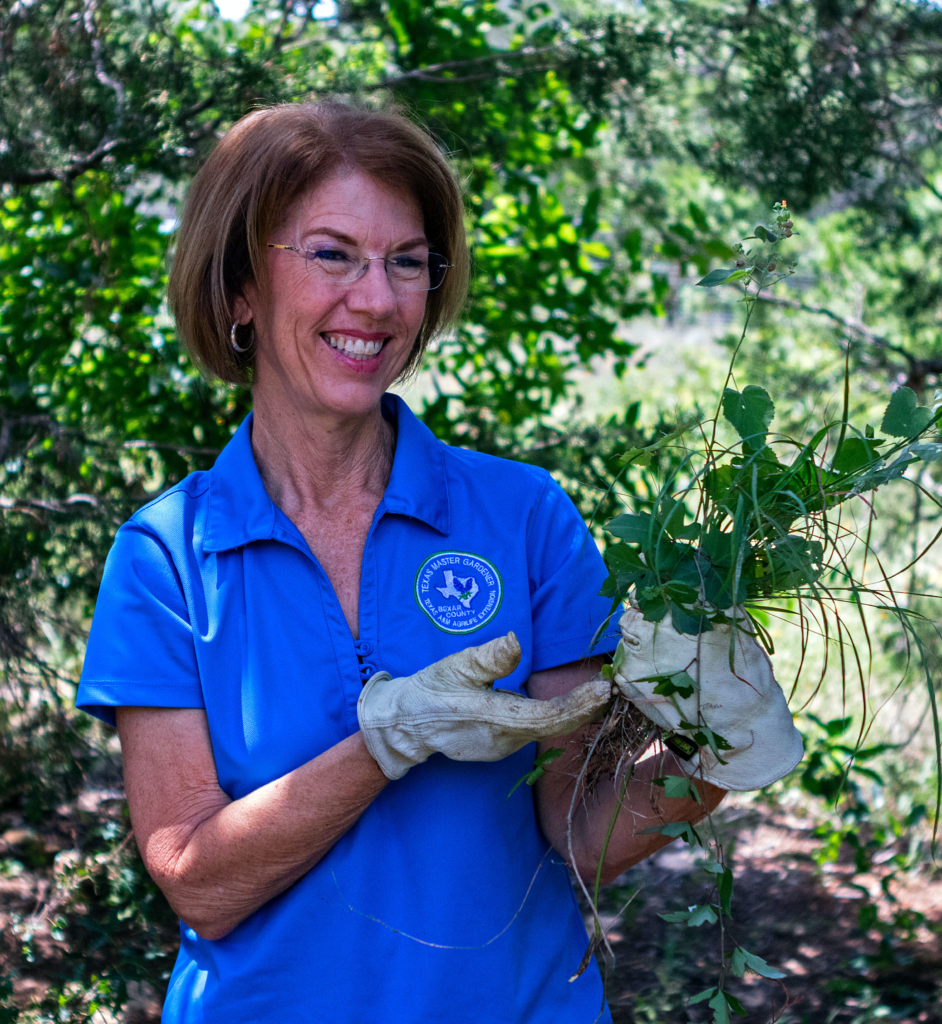
BCMG President

June is here and changes are happening! Spring will be changing to summer this month and our Scion is also changing!
Many years ago, before emails and other online communications, the Scion was a printed document that was mailed to Bexar County Master Gardeners to share the news. As computers became more common in homes, the Scion moved to a digital format which was also shared with fellow community gardeners as well as the Bexar County Master Gardeners. Now we are making another change!
The Scion has changed its focus from a newsletter for Master Gardeners to an online educational source for all Bexar County gardeners from the Bexar County Master Gardeners! You will find in this issue articles on gardening topics from BCMGs as well as other Texas A&M AgriLife Extension sources. Also, we have listed many wonderful online educational opportunities that are available to you!
We have also implemented an interactive index so you can go directly to the information you want to read!
Please enjoy and let me know what you think about the changes ([email protected]) and if you have a topic you would like to see us address, please send a note to the Scion’s editor at [email protected].
Happy gardening and stay safe!
Lynn
Scion Index – Click and Go!
- Gardening
- Wise Water Words
- Texas Superstar Spotlight – Blue Daze
- In the Garden Articles
- Sacred Garden
- 2020 Victory Gardens
- Neville’s Garden Spot
- Plant Answers from the Plant Man
- Gardening Education – Online Opportunities
- Master Gardener Corner
- Can You Help?
BCMG offices are still closed at this time. That could change, so call before you make a trip over there.

Click here for website
They have also started having programs via “Distance Learning”. Check their calendar often for particulars!

June Brings Father’s Day and High Temperatures
We’ve been spared the heat so far, but we should brace and prepare for the inevitable triple digit temperatures. As we do this in our landscapes, we should also think of the wildlife that grace our gardens. Birdbaths about 2” deep are one of the easiest and most common ways to provide water to our feathered friends. It’s important to keep these clean and regularly filled with clean water. A quick brushing with a kitchen brush works well to keep the algae away, then rinse and fill with fresh water. Location is also important, and placing the birdbath near a tree or shrub for protection from predators will help to keep birds safe and coming back for more.
Butterflies and other beneficial insects also need water sources, but they prefer shallow water. Adding large rocks to a birdbath can give insects a safe place to land and quench their thirst. Filling a shallow saucer with rough pebbles, and half-full with water can allow numerous types of the good bugs to drink their fill. A small branch or two all the way to the edge acts as a bridge for smaller insects. Place these containers directly in a garden bed so they are accessible to small walking insects as well as flying ones. Again, keep these clean and with fresh water daily.
Enjoy the various types of life that frequent your gardens and landscapes as well as the beautiful plants and blooms. Gardens truly are living spaces.
Conservationally Yours,
Anna Vogler
Water Conservation Coordinator


A_Sacred_Garden-
Victory Gardens of 2020
by Josie Seeligson, BCMG
The first time in March 2020 that I walked into a grocery store and saw shelves empty of produce, meats, paper goods and more, I had a panic attack. It wasn’t that I didn’t have supplies at home—I did—so if I was panicking, I can’t imagine what less fortunate people were feeling. Spring 2020 was surreal for all, ripe with Covid-19 pandemic anxieties, contamination fears, stay-at-home orders, people out of work, students home from school, economic downturns, hoarding, and food supply disruptions. As food insecurity increased for many, so did lines at food banks. While it’s not the first time that crisis has hit our nation or world, it’s the first time for many, at least in a long while, to experience these conditions first-hand. Luckily, gardeners do have some historic models to help food supply, health and morale.
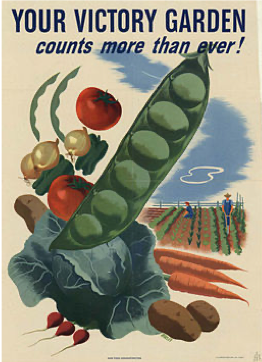
During hardships of WWI and II, many Americans cultivated “Victory Gardens,” using any scrap of land—in yards, parks, on rooftop or fire escapes—to grow vegetables and be self-sufficient, so that the food supply chain felt less pressure and wouldn’t be disrupted, and so all Americans, soldiers and civilians, would have enough nutritious food to thrive and succeed. Local gardens reduced need for tin, food transportation and rationing. Governments in both the US and the UK advertised encouragement with tin signs and posters reading, “Dig for Victory, grow your own vegetables,” or “Will you have a part in Victory?” By 1942, half of Britain’s civilian population was part of the “Garden Front,” and 10,000 square miles of land had been “brought under the plough.”

Today, gardens (sometimes called “resilience gardens”) serve similar support roles. The pandemic hit the US early enough in spring 2020 that many people got busy growing right away, whether or not they had gardened beforehand. Raised beds were constructed at record speeds. People repurposed or acquired containers large and small, in plots or windowsills, and filled with soil and amendments. Started plants and seeds soon yawned skyward, their fragile green forms full of fresh potential. With the right elements and tending sprinkled in, by late spring, nutrient-rich vegetables, fruits, and herbs were harvested, eaten and shared, without additional trips to grocery stores, as communities aimed to flatten the curve and fight the battle against an invisible enemy. For many, bounty will continue into summer with heat-tolerant vegetables and fruits, and in no time Texas gardeners will begin plotting for fall victory gardens.
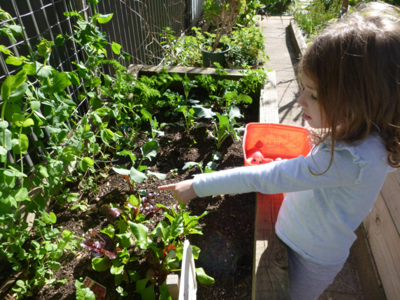
Gardens provide other victories, too. Their tenders benefit from the physical movement, mental therapy and Vitamin D. People looking for hobbies to pass time during social distancing have enjoyed personal health and community benefits of gardening: goals and productivity during idle time, seeing real fruits of their labors, bonding with family in shared activities, joining community garden efforts, and donating healthy food to others. Being on the giving or receiving end of garden-grown produce can be a simple, soul-warming delight, and who doesn’t need a bit more of that these days? On a larger scale, community gardens such as the SA Botanical Center Children’s Garden and Culinary garden have donated produce to the SA Food Bank to help feed the many people still out of work. Nurseries have seen a spike in seed and vegetable sales, and websites are selling “Victory Garden Starter Kits,” planters, seeds and how-to books. In short, gardening is blooming, and people are reaping its many benefits. Let’s be thankful for small victories.
Nevilles-Garden-Spot-v2-2

Gardening can influence and benefit your Mental Health
How to Care For Succulents
Gardening Education – Online Opportunities for Master Gardeners and the Public
Frequently check the BCMG Calendar, as that is where all the new, upcoming programs will be posted. Click Here

- June 3 – The Other Beneficial Insects – Predators – 12:00 pm-1:00 pm CDT
- June 10 – The Other Beneficial Insects – Parasitoids and Recyclers – 12:00 pm-1:00 pm CDT
To join each Gardening Webinar at the appointed date and time, click here...

Past webinars are posted on YouTube for your viewing (or reviewing) pleasure! Check often for new postings! Click here for the list.
- Vegetable Garden Basics
- Top 10 Insects of Summer
- Getting Your Landscape Ready for Summer Heat
- Tropical Escape with Texas Superstar Plants
- Growing Citrus on your Patio and Lanscape

https://aggie-horticulture.tamu.edu/fblive/https://aggie-horticulture.tamu.edu/fblive/
Just a few of them are:
- Raised Garden Beds, Location, Soil Mixtures and more!
- Home Fruit Production – Tips for Success!
- Small fruits for the backyard
- Floral Designs from your backyard – Growing, Cutting, Using your flowers and shrubs!
- Backyard Grapes/Vineyards
- How to Prune Your Trees
- Drip Irrigation Essentials
- Indoor Gardening
- Growing Blueberries in Containers

- Join in on what local gardeners are talking about
- Upload a plant photo and get advice on what the plant is (or what’s wrong with it)
- Ask questions about your yard and garden or help others!
- Click here to join!

Get the full list here
- Landscape Water Conservation
- Low-Volume Irrigation
- Irrigation System Auditing
- Safe Use and Handling of Pesticides
- Safe Use and Handling of Fertilizers
- Composting
- Designing an Earth–Kind® Landscape
- Landscaping for Energy Conservation
- Creating Native Habitat
- Earth–Kind® Roses
- Integrated Pest Management
- Pest Management for Crape Myrtles
- Rainwater Harvesting
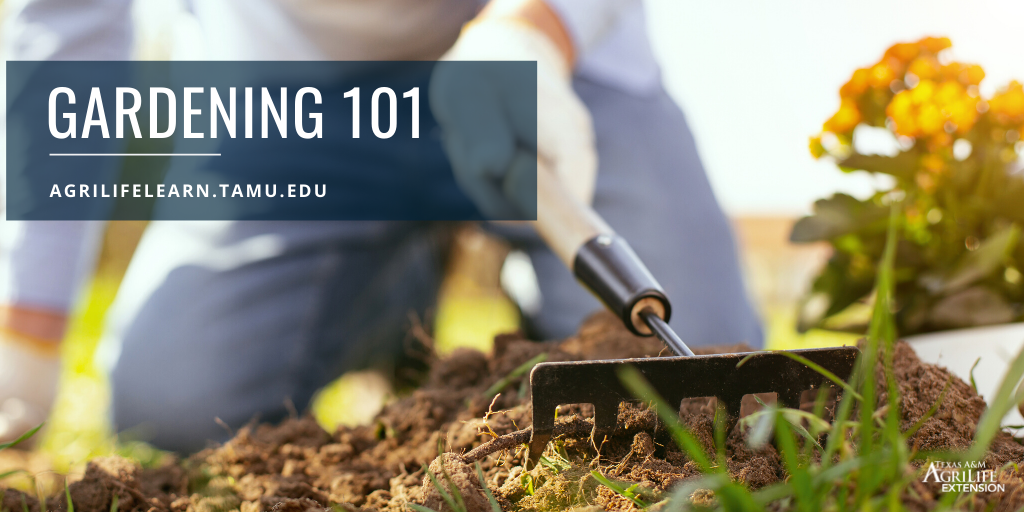
Free and open to the public.
Click here to register
Learn more about:
- Plant Growth and Development
- Soil, Water and Plant Nutrition
- Earth-Kind landscaping
- Plant Health
- Fruit and Nut Plants
- Vegetable and Herb Gardening
- Landscape Horticulture
- LawnCare

BCMG is on YouTube! Watch classes on a computer (or on your smartphone)!
The new June 2020 video is Crepe-Myrtle Bark Scale
- Crape-Myrtle Bark Scale
- Herb Gardening
- Propagation by cuttings
- Rainwater Harvesting with Lou Kellogg
- San Antonio: It’s History and Water
- Texas Superstar
- Starting Vegetables from Seed Indoors
- Organic Gardening
Check often for other new videos! The whole list of available videos is HERE.

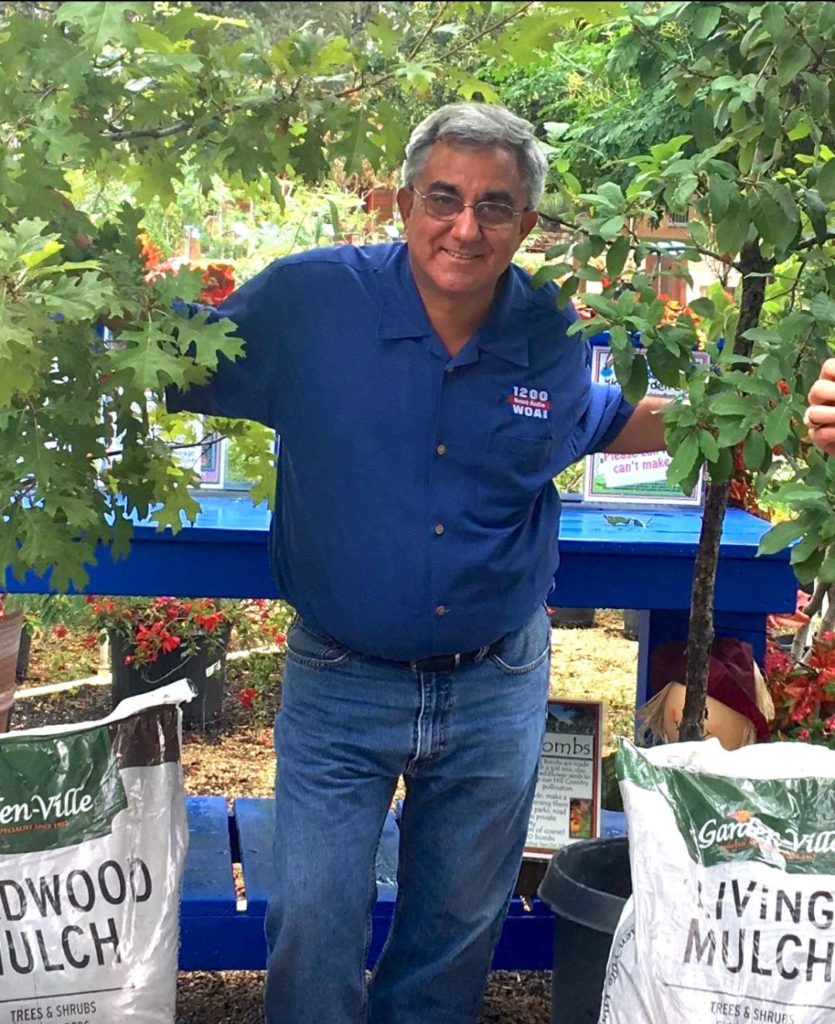
Call in to Live Radio on Saturday mornings, with your gardening questions for David.
Call in: 210-737-1200 or 1-800-383-9624 on Saturdays from 7 am to 10pm
Or just listen to the show, and learn about everyone else’s questions!
WOAI 1200 AM – Lawn and Garden Show
Host: David Rodriguez, Bexar County AgriLife Extension Horticulturist
Past shows are archived here, for easy listening on your computer or phone, anytime! Listen on your phone while you drive!

Ask a Master Gardener
Master Gardeners are available to help you with your gardening questions. We provide unbiased, research-based, locally relevant gardening information. Free service. You can reach us:
By phone: (210) 631-0400 (Ask to speak to a Master Gardener)
Mon-Fri 9 am – Noon, 1-4 pm (Closed on county holidays)
Even during Covid-19 precautions, the phone and the Hotline is being operated from home telephones, hotline calls being directed by AgriLife Extension receptionist Nick Vasquez.


Scion-PlantAnswers-QA-2020-06-
Member’s Corner

Each year, Master Gardeners must certify for the following year. Once they complete requirements, they receive the Maroon Bluebonnet Service Pin. They must complete:
- at least 30 volunteer hours in the community
- 6 Continuing Education Units (CEUs) to keep their knowledge current
- attend two regular BCMG monthly meetings.
Congratulations to the four Bexar County Master Gardeners who earned their 2020 certification in May.
- Michelle Hobbs
- Muriel Lanford
- Donna Meyer
- Ruth Rea
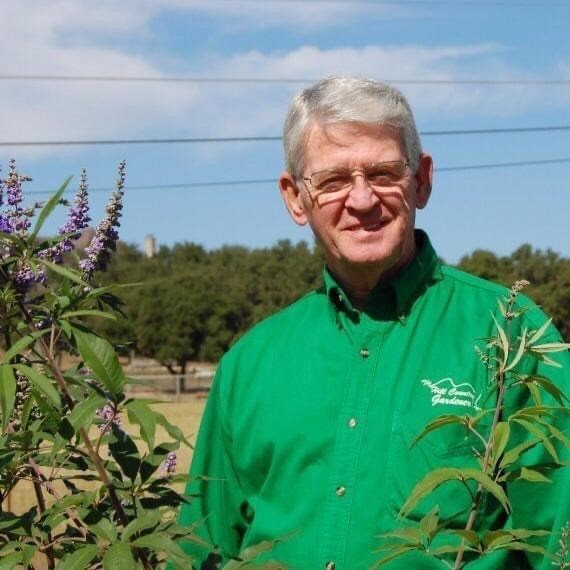
With a heavy heart, we share the passing on May 20, 2020 of Honorary Bexar County Master Gardener, Thomas “Tom” Harris, “The Hill Country Gardener.”
